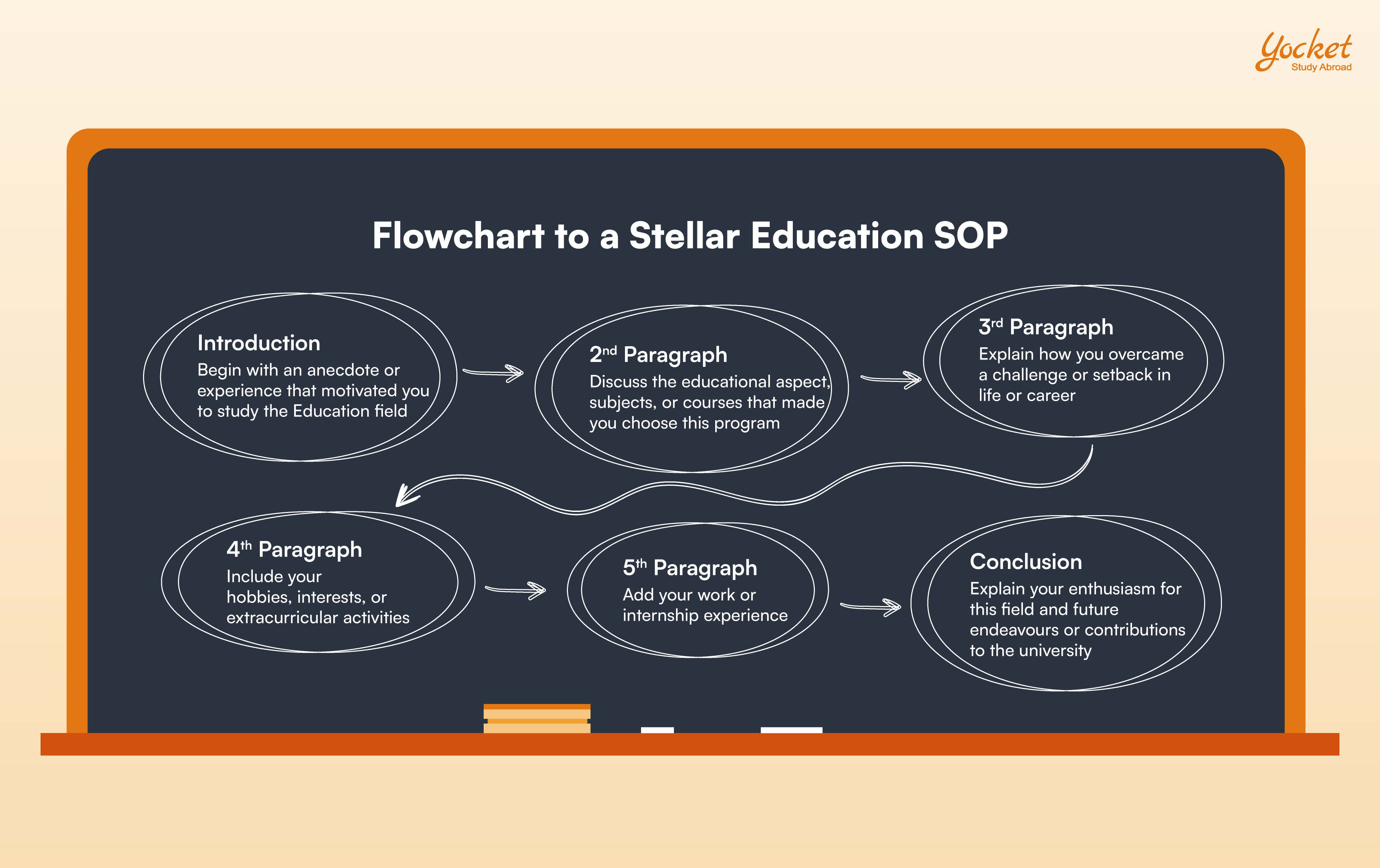To begin writing your SOP for masters in education, introspect, brainstorm, research, and collect your thoughts. Among the details in your SOP should be life experiences, academic and professional backgrounds (if applicable), career goals, co-curricular activities, volunteering/community involvement, and more.
So, refer to the effective guidelines given below to draft a stellar statement of purpose for masters in education for education programs.
![How to Draft a Statement of Purpose for Education]()
What drove you towards choosing education as your interest? What is the most powerful experience that led you to choose this field? For example, how on Teachers’ Day, you took English lessons for the kids near your residence and that experience of imparting knowledge built your passion for teaching and education.
- Start the introduction with a striking experience that is suggestive of your interest and journey into the field.
- Alternatively, you might begin with a research problem statement that you consider exploring in your future MA/M.Ed program.
- However, the main idea here is to show your familiarity with the educational research currently underway at the school of education in your selected university.
|
For example, the Graduate School of Education at Stanford University clearly mentions that a student might be unsure about which particular social sciences would be the most important in their study. Being unclear about these matters is not inappropriate when one is applying to a broadly focused master’s program. So, the key ingredient here is to introspect and focus on how education motivates you and begin your SOP likewise.
|
Second Paragraph
Developing on the idea of how education motivates you, write about relevant academic and life experiences that have boosted your interest in the field. How has each of these experiences directed your thought process, streamlined it, or transformed it?
- Here, you can describe the relevant undergraduate experiences or courses that led you to develop an interest in education.
- For example, you might have developed an interest in educational psychology or the different philosophies of education.
- Write about a few course specifics and how these led you to develop your portfolio and inspired you to work on projects relevant to these interests.
- You can include any interesting projects you worked on or relevant co-curricular experiences worth sharing. Make sure that your experiences align with your interest in the Education program you’re applying for.
|
For instance, if you are applying for an MA in Education for Bilingual Education/ASL(Assessment of Listening and Speaking), your project on digital environments of deaf education intended for people suffering from a hearing disability and their educational prospects will be a relevant experience to substantiate and illustrate your purpose for choosing this field.
|
Have you gone through a setback or failure in your academics? If you just made the cut or have lesser scores, you can mention those in this paragraph.
- Have you faced any other unique challenges or setbacks that have redefined your perspectives or interests? It can be any physical setback or even an academic one.
- Mention the ways in which you overcame the challenge faced along with and the result of these experiences.
- It’s imperative to reflect on the lessons from these experiences to highlight your strength and resilience.
-
Fourth Paragraph
In this paragraph, you can include extracurriculars. It is a fact that universities are interested to know more than just academics. So, go ahead and describe your hobbies, social work, volunteering, etc, here. You can also include the details of any workshops or certifications which you have taken to upgrade your skills.
|
However, it’s very important to not make the sample SOP for masters in education an embellished version of your resume.
|
In this paragraph, you can describe your job role or any work experience that you may have. In case of a lack of work experience, any internship experience can also be added, while contemplating the acquired skills and learnings. Analyse a knowledge gap and or the need for you to go for MA in Education/ M.Ed.
- How have your undergrad studies and work experience/s influenced your career goals? Why do you wish to go for MA in Education/ M.Ed at this point in your career?
- Write about your short-term and long-term goals.
- How will the MA in Education/ M.Ed program from a specific university help you achieve these goals?
- How does the program align with your areas of interest?
|
In order to be considered, universities want to check your motivation for applying to their programs. Thus, it sits well to explain your reason for choosing the school and the program. Try to familiarize yourself with the values of the university and compose this paragraph accordingly.
|
The idea is to keep your conclusion as engaging as the introduction.
- What makes you a valuable contributor to the University?
- How can you be an asset to the University?
- What activities, clubs, sports, student associations, groups, etc, piqued your interests?
- What diverse experiences do you bring to your future graduate community?
|
Conclude with your expectations from the program and how you look forward to receiving, assimilating, and contributing to new knowledge at the University.
|
Suggested: How to Write a Good SOP?









